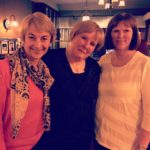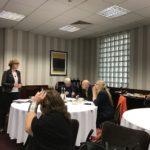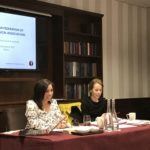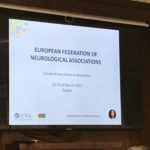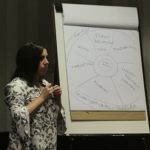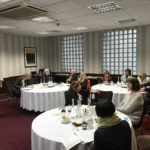A 2-day workshop on Governance was organised by the European Federation of Neurological Associations – EFNA, in Dublin, Ireland last week. It was held alongside the Extra General Assembly and members of the EFNA Board as well as representatives of member organisations from disease areas such as epilepsy, Huntington’s, ADHD, ataxia, Brain tumor and more were present.
EFNA is the umbrella organisation for neurological patient organisations across Europe and has at the moment 20 members. Dystonia Europe is a member and Executive Director Monika Benson is on the EFNA Board.
EFNA’s vision is ”better quality of lives for people living with neurological disorders in Europe”. By focusing on activities within the field of advocacy, awareness, empowerment, and engagment the purpose is to add capacity and value to the work of its member associations.
Noemi Ambrus, Senior Trainer at Civil Support in Budapest, Hungary, led the workshop which aimed to inspire our everyday organisational work as well as update the EFNA Constitution by providing information and opportunity for discussion on topics such as Governance, Transparency and Member Engagement.
Governance – Noemi compared the Board with the Control Tower, and the Pilot driving the plane and its passengers, she compared with the Executive Director and the patients in the organisation. The role of the Board is to keep an eye on everything in order to follow the strategic plan of the organisation. The management wheel of a non-profit organisation includes: Administration, fund raising, finance, public relations & communication, human resources and marketing. It’s not sustainable if the board is doing everything. It is important to have documents covering work descriptions for board members, code of conduct, conflict of interest, confidentiality agreement in place.
Recruitment of board members is done by getting to know the member organisations and their boards to identify people with the skills needed on the Board. It is recommended that most board members are patients and that they are elected at different times to sustain quality and experience. There should be time limits on how long you can be a board member. An Ex Oficio Board member is the Executive Director who can vote and take part in all discussions except matters regarding his/her contract, salary etc.
The question was raised whether an election committee is used in international organisations. This is common for the Scandinavian organisations where an election committee is involved in getting to know members and suggesting them to the board. One participant shared that they had tried this in their international organisation with no success. Noemi pointed out that ”member organisation have the possibility to submit nominations for board membership.”
To facilitate for new board members it is recommended with a ”Welcome package” containing all they need to know about the organisation – background, values, work description etc.
It is recommended to have routines for financial and internal control and to follow up the work of the Board by evaluations of both meetings, board members and staff in order to create good and efficient work atmosphere.
Regarding fund raising it is advicable to aim for four legs as income stream to secure the sustainability of the organisation.
Membership – why is it important to be a member of EFNA?
The group discussed the topic and came up with the following benefits of being a member of EFNA:
- Forum for dialogue
- Knowhow can be shared
- Platform for rare diseases
- Contacts/memberships
- Network
- Perspective on other diseases
- Credibility
- Fund raising opportunities
- Training and capacity building
Transparency
During this session participants were asked to look at their organisation’s website to check its transparency and accountability.
Does the website include the following?
- Organisational goals – Mission & Vision; Strategic & Operational plan; Activities & Projects; Impacts; History
- Transparency and fund raising – List of donors; Contribution from donors, framework/policy for cooperation; fund raising expenditure;
- Website – Navigation; Frequency of updates; News, blogs; Events; Continuity; Cookie policy; Members only area
- Finance – Annual report; Balance sheet
- Members – list of members; membership criteria; application process; benefit of membership; updates on members’ activities
- Governance – Board members; Statutes
When the participants shared their work and most successful projects and activities at the Wednesday evening dinner, it was very obvious that we have much in commom despite our different disease areas. It was concluded that these kind of workshops are very valuable in order to grow our patient advocacy network, share best practice, and learn from each other to move forward with the work of our own organisations.
Many thanks to EFNA Executive Director Donna Walsh for initiating this workshop and to Noemei Ambrus for a very interesting workshop, and to all the participants for inspiring and fruitful discussions.
While in Dublin President Merete Avery and ED Monika Benson met with Dystonia Ireland Chairwoman Maria Hickey to discuss the on-going work of our organisations and future collaboration. Maria shared that her organisation has about 750 members. They focus a lot of their work on partnerships with dystonia researchers. By organising fund raising events such as mini marathons, sale of Christmas cards etc. they have over the years funded research projects for more than € 300 000. We congratulate Maria and her team of Dystonia Ireland on this success.
- Monika, Maria and Merete!
- Hotel Clayton in Dublin…
- EFNA President Ann Little opening the workshop and welcoming the participants.
- Noemi Ambrus, Civil Support and Donna Walsh, EFNA Executive Director
- Wlecom.
- The management wheel.
- Participants.
